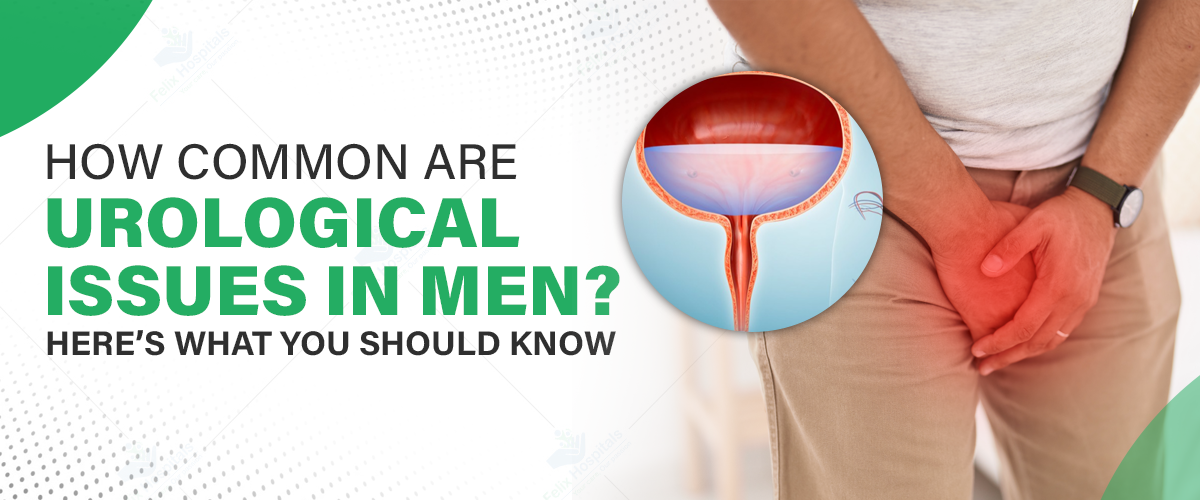
Subscribe to our

Urological health plays a crucial role in men’s overall well-being, affecting both urinary and reproductive functions. From young adults to elderly individuals, men across all age groups experience various urological conditions that can impact their quality of life. The prevalence of these issues highlights the importance of recognizing symptoms early and seeking timely treatment at the best urology hospital in Noida to prevent complications.
For expert care, schedule a consultation with the Best urologist at Felix Hospitals by Calling +91 9667064100.
Urological issues refer to medical conditions that affect the urinary tract, kidneys, bladder, and male reproductive organs. These conditions can range from mild infections to severe disorders requiring surgical interventions. Some of the Top Urology Issues Affecting Men include:
Urological issues are widespread among men, with research indicating that nearly 30-50% of men experience some form of urological disorder during their lifetime. The frequency of these problems varies with age:
Lifestyle factors such as obesity, poor diet, smoking, and a sedentary routine contribute significantly to the rise of these issues, making regular check-ups at a best urology hospital in Noida essential for early detection and treatment.
1. Urinary Tract Infections (UTIs)
2. Erectile Dysfunction (ED)
3. Benign Prostatic Hyperplasia (BPH)
4. Prostate Cancer
5. Kidney Stones
6. Urinary Incontinence
If you are experiencing symptoms of an Overactive Bladder (OAB) or any urological disorder, consult Dr. Bhanwar Lal Barkesia, one of the most highly experienced urologists at Felix Hospital. Dr. Barkesia specializes in diagnosing and treating OAB, kidney disorders, prostate problems, and male infertility. With a patient-centric approach, he provides personalized treatments for individuals dealing with conditions linked to diabetes, obesity, and chronic diseases. If you are searching for the best doctor for urology treatment in Noida, Felix Hospital is your trusted destination.
Schedule a Consultation today to take proactive steps toward better urological health!
Urological issues are a common yet often overlooked aspect of men’s health. Conditions like BPH, erectile dysfunction, and prostate cancer can significantly impact daily life if not addressed timely. Prioritizing urological health through regular check-ups, lifestyle improvements, and expert medical guidance can help men lead a healthy life.
Q1- Can frequent nighttime urination be a sign of a serious urological issue?
ANS: Yes, excessive nighttime urination (nocturia) can indicate an underlying condition such as an enlarged prostate (BPH), diabetes, or even an overactive bladder. If you wake up multiple times at night to urinate, it’s advisable to consult a urologist.
Q2- Is there a connection between kidney stones and prostate health?
ANS: While kidney stones and prostate conditions like BPH or prostate cancer are separate issues, they can sometimes share symptoms like painful urination or urinary blockage. Additionally, dehydration, which contributes to kidney stones, can also impact prostate health.
Q3- Can erectile dysfunction be an early warning sign of heart disease?
ANS: Yes, erectile dysfunction (ED) can be an early indicator of cardiovascular problems. Poor blood flow due to clogged arteries can affect both heart health and erectile function. If you experience persistent ED, a cardiac check-up might be beneficial.
Q4- How does obesity contribute to urological problems in men?
ANS: Obesity increases the risk of several urological issues, including kidney stones, erectile dysfunction, and lower urinary tract symptoms (LUTS) associated with BPH. Excess weight puts pressure on the bladder, leading to incontinence and worsening urinary symptoms.
Q5- Can stress and anxiety trigger urinary problems in men?
ANS: Yes, psychological factors such as stress and anxiety can lead to overactive bladder symptoms, frequent urination, or even exacerbate erectile dysfunction. Stress management techniques like meditation and exercise can help improve urological health.
Q6- Does prolonged sitting impact prostate health?
ANS: Sitting for extended periods can put pressure on the prostate gland, potentially leading to discomfort, prostatitis (inflammation), or worsening BPH symptoms. Regular movement and proper posture can help alleviate these issues.
Q7- Are there any early signs of prostate cancer that are often overlooked?
ANS: Prostate cancer can be asymptomatic in its early stages. However, subtle signs such as unexplained weight loss, changes in bowel habits, discomfort in the pelvic area, or mild difficulty urinating should not be ignored and warrant a medical check-up.